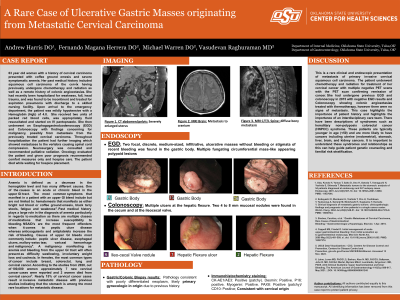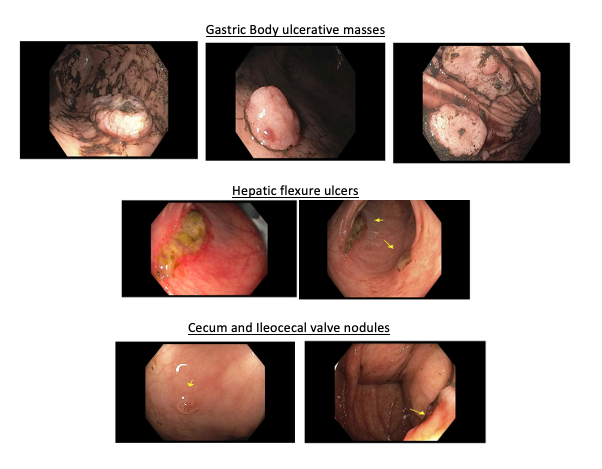Monday Poster Session
Category: Stomach
P3406 - A Rare Case of Ulcerative Gastric Masses Originating From Metastatic Cervical Carcinoma
Monday, October 28, 2024
10:30 AM - 4:00 PM ET
Location: Exhibit Hall E

Has Audio

Andrew M. Harris, DO
Oklahoma State University
Broken Arrow, OK
Presenting Author(s)
Andrew M. Harris, DO1, Fernando Magana Hererra, DO2, Michael Warren, DO2, Andrea Goethals, DO3
1Oklahoma State University, Broken Arrow, OK; 2Oklahoma State University, Tulsa, OK; 3Ascension Genesys, Grand Blanc, MI
Introduction: Anemia is defined as a decrease in the hemoglobin level and stems from multiple different etiologies. One common cause of anemia is bleeding from the gastrointestinal (GI) tract, which is further divided into upper and lower GI bleeding. The most common cause of an upper GI bleed is peptic ulcer disease however, there remain a wide variety of different causes. Occasionally, malignancy is the inciting event of an acute GI bleed that elicits further investigation. Cervical cancer - specifically squamous cell carcinoma of the cervix - affects 7 out of 100,000 women per year and has a 5-year survival rate of 55%, while metastasis lowers the 5-year survival rate to 16.5%. Metastasis generally occurs in the setting of an uncontrolled primary malignancy with metastatic locations of cervical cancer generally involving lung, breast and ovaries with less than 2% of documented cases metastasizing to the stomach and most patients presenting as asymptomatic.
Case Description/Methods: A 63-year-old female with previously treated cervical cancer presented to the ER with coffee ground emesis. She had multiple previous PET scans showing a remission of cancer approximately 7 years prior. In the ER she was initially hypotensive with a hemoglobin of 5.2. She was transfused and the gastroenterology team was consulted. During endoscopic evaluation, she was found to have ulcerative masses in the gastric body that were biopsied and later identified by pathology as metastasis from a primary gynecologic origin. During hospitalization, the patient was found to have bilateral lower extremity weakness and underwent MRI evaluation. She was found to have spinal metastasis and cord compression requiring neurosurgery evaluation who recommended palliative radiation. Oncology evaluated the patient and given the poor prognosis and poor respiratory status, did recommend comfort measures only and hospice care. The patient died while waiting for hospice placement.
Discussion: This is a rare case presentation as metastasis from gynecological cancer is rarely found during endoscopic evaluation. A literature search found that gastric lesions were identified in less than 2% of patients with metastatic cervical cancer and were generally found to be asymptomatic. The rarity of this case stems from the fact that the patient had undergone chemotherapy and radiation with multiple negative PET scans confirming remission of her cervical cancer as well as a previous endoscopic evaluation with EGD a few years prior with no evidence of metastasis.

Disclosures:
Andrew M. Harris, DO1, Fernando Magana Hererra, DO2, Michael Warren, DO2, Andrea Goethals, DO3. P3406 - A Rare Case of Ulcerative Gastric Masses Originating From Metastatic Cervical Carcinoma, ACG 2024 Annual Scientific Meeting Abstracts. Philadelphia, PA: American College of Gastroenterology.
1Oklahoma State University, Broken Arrow, OK; 2Oklahoma State University, Tulsa, OK; 3Ascension Genesys, Grand Blanc, MI
Introduction: Anemia is defined as a decrease in the hemoglobin level and stems from multiple different etiologies. One common cause of anemia is bleeding from the gastrointestinal (GI) tract, which is further divided into upper and lower GI bleeding. The most common cause of an upper GI bleed is peptic ulcer disease however, there remain a wide variety of different causes. Occasionally, malignancy is the inciting event of an acute GI bleed that elicits further investigation. Cervical cancer - specifically squamous cell carcinoma of the cervix - affects 7 out of 100,000 women per year and has a 5-year survival rate of 55%, while metastasis lowers the 5-year survival rate to 16.5%. Metastasis generally occurs in the setting of an uncontrolled primary malignancy with metastatic locations of cervical cancer generally involving lung, breast and ovaries with less than 2% of documented cases metastasizing to the stomach and most patients presenting as asymptomatic.
Case Description/Methods: A 63-year-old female with previously treated cervical cancer presented to the ER with coffee ground emesis. She had multiple previous PET scans showing a remission of cancer approximately 7 years prior. In the ER she was initially hypotensive with a hemoglobin of 5.2. She was transfused and the gastroenterology team was consulted. During endoscopic evaluation, she was found to have ulcerative masses in the gastric body that were biopsied and later identified by pathology as metastasis from a primary gynecologic origin. During hospitalization, the patient was found to have bilateral lower extremity weakness and underwent MRI evaluation. She was found to have spinal metastasis and cord compression requiring neurosurgery evaluation who recommended palliative radiation. Oncology evaluated the patient and given the poor prognosis and poor respiratory status, did recommend comfort measures only and hospice care. The patient died while waiting for hospice placement.
Discussion: This is a rare case presentation as metastasis from gynecological cancer is rarely found during endoscopic evaluation. A literature search found that gastric lesions were identified in less than 2% of patients with metastatic cervical cancer and were generally found to be asymptomatic. The rarity of this case stems from the fact that the patient had undergone chemotherapy and radiation with multiple negative PET scans confirming remission of her cervical cancer as well as a previous endoscopic evaluation with EGD a few years prior with no evidence of metastasis.

Figure: Endoscopic findings
Disclosures:
Andrew Harris indicated no relevant financial relationships.
Fernando Magana Hererra indicated no relevant financial relationships.
Michael Warren indicated no relevant financial relationships.
Andrea Goethals indicated no relevant financial relationships.
Andrew M. Harris, DO1, Fernando Magana Hererra, DO2, Michael Warren, DO2, Andrea Goethals, DO3. P3406 - A Rare Case of Ulcerative Gastric Masses Originating From Metastatic Cervical Carcinoma, ACG 2024 Annual Scientific Meeting Abstracts. Philadelphia, PA: American College of Gastroenterology.
